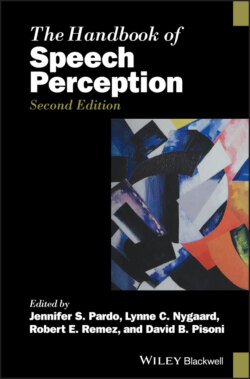Читать книгу The Handbook of Speech Perception - Группа авторов - Страница 79
Lexical access
ОглавлениеResults showing that the perception of phonetic categories is graded and is influenced by the goodness of the stimulus input raises the question of potential effects on lexical access. One possibility is that phonetic category membership is resolved at the phonetic‐phonological level and the fine acoustic differences leading to graded responses at this level are not mapped onto higher levels of processing. Alternatively, given the functional architecture of the speech and lexical processing system proposed earlier, graded phonetic category representations should influence the mapping from the phonetic‐phonological levels to lexical representations. Results of a series of experiments using various methodologies support this latter hypothesis.
Using the visual world paradigm, it has been shown that access to lexical representations is affected by the fine acoustic structure of the auditory input. In particular, it has been shown that looks to a visual target are affected by within‐phonetic‐category acoustic differences (McMurray, Tanenhaus, & Aslin, 2002; see also McMurray, Tanenhaus, & Aslin, 2009). In the 2002 study of McMurray and colleagues, eye movements were measured as participants identified a named target word (using a mouse click) from an array of four pictures. The pictures consisted of a target word whose name began with a labial stop consonant, for example pear, a minimal pair of the target bear, and two phonologically unrelated words, for example lamp and ship. The auditorily presented names varied along a [b]–[p] VOT continuum ranging from 0–40 ms in 5 ms steps. Results showed graded responses with increasing looks to the competitor minimal pair (i.e. bear) as the acoustic‐phonetic input (a VOT variant of [p]) approached the phonetic boundary. These findings show that lexical access is indeed graded.
Perhaps stronger evidence of the effects of within‐phonetic‐category differences on access to higher levels of processing comes from studies showing that within‐phonetic‐category effects not only influence access to lexical representations but also cascade to the lexical semantic network. Examining semantic priming in a lexical decision task, Andruski Blumstein, and Burton (1994) presented prime words semantically related to a target stimulus in which the initial voiceless stop consonant of the prime was an exemplar stimulus (spoken naturally and acoustically unmodified) or it was a poorer exemplar of the voiceless stop phonetic category (the VOT was reduced by one third or two thirds). Shortening the VOT of the stimuli rendered them closer to the voiced phonetic category boundary. Importantly, pilot work showed that stimuli presented alone were perceived correctly as beginning with voiceless stop consonants. However, the reduction of the VOT for the acoustically modified stimuli resulted in a reduction in the magnitude of semantic priming relative to the unmodified prime stimuli, particularly for the primes reduced by two thirds.
In a later study, Misiurski and colleagues (2005) showed that, in addition to the effects described of reduced semantic priming when an initial voiceless stop consonant of a prime word is shortened, that is, reduced priming for t*ime‐clock compared to time‐clock, mediated semantic priming emerged for the minimal pair competitor, that is, t*ime primed penny via dime. Not surprisingly, the magnitude of the mediated semantic priming was less than that obtained for dime–penny. These mediated priming results provide further evidence for the cascading effects of the acoustic input on access to the lexical semantic network. In particular, it shows that the acoustic modification of a prime stimulus not only influences the activation of the lexical semantic network of its semantically related target, but also partially activates the lexical representation of the contrasting voiced minimal pair competitor and subsequently its lexical semantic network.
